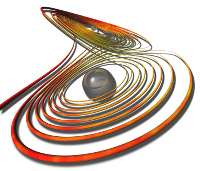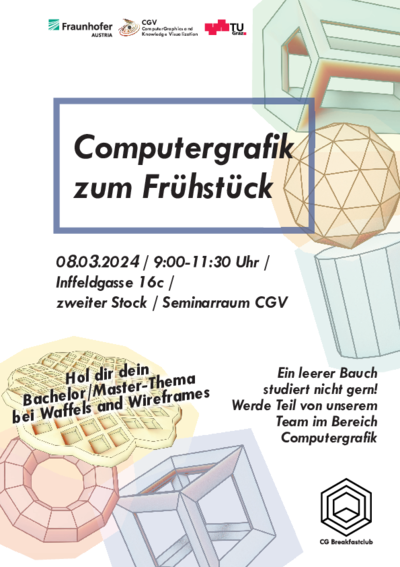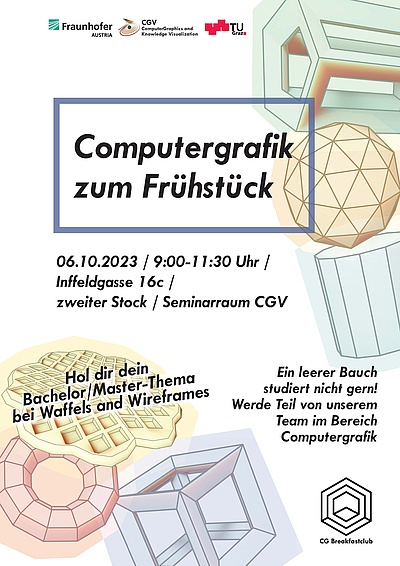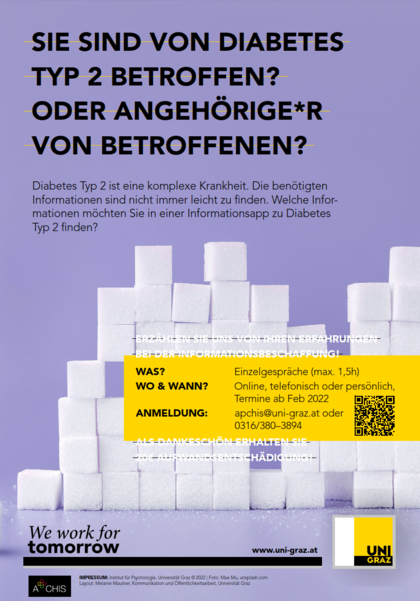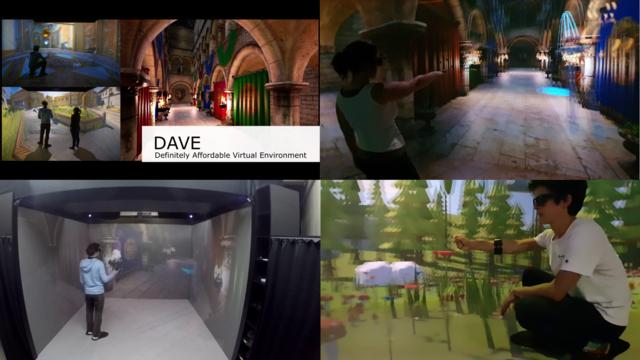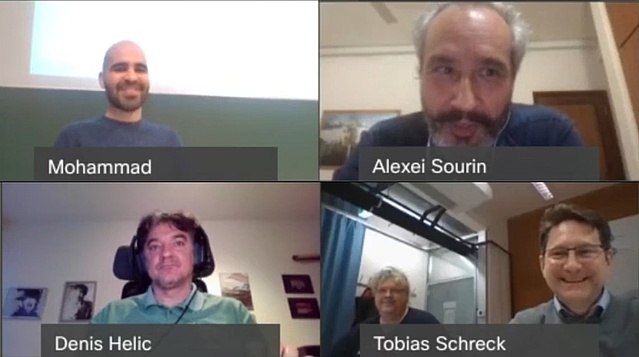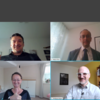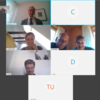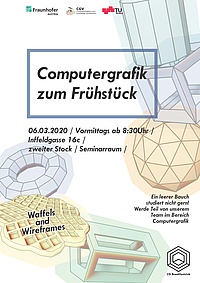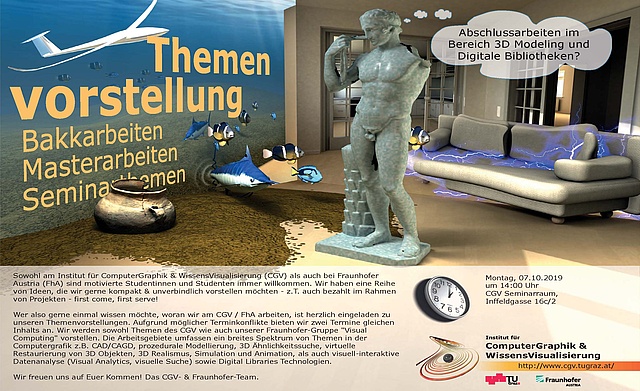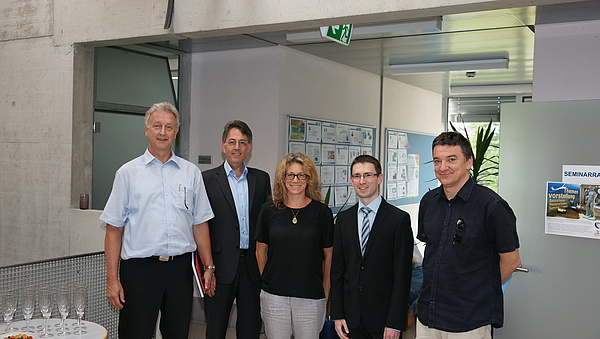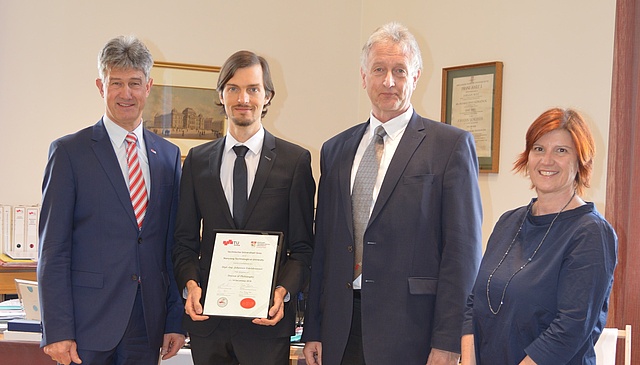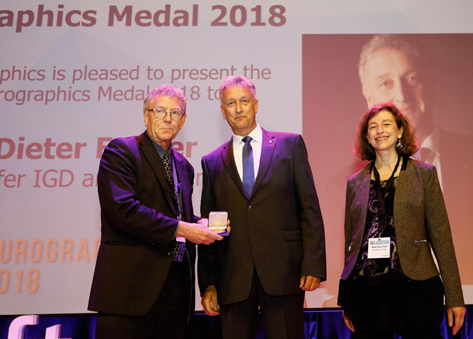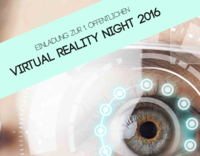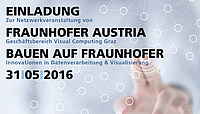Recent CGV papers 31. May

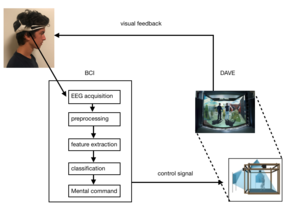


We had a sucessful month of submissions. We have two papers accepted at CGV 2024, which will also be published by Springer in the Visual Computer Journal:
- Barzegar Khalilsaraei, S., Komar, A., Zheng, J., Augsdörfer, U.: InceptCurves: Curve Reconstruction Using an Inception Network https://link.springer.com/article/10.1007/s00371-024-03477-1
- Ruprecht, I., Preiner, P., ... crowed simulation
Three very different and interesting CGV papers were presented at WSCG 2024. Congratulations to all students who presented!
- Gamillscheg, F., Ruprecht, I., Settgast, V., Pietroszek, K., Augsdörfer, U.: Brain Computer Interfacing with a Virtual Environment
- Komar, A., Kammerer, M., Barzegar Khalilsaraei, S., Augsdörfer, U.: LatEd: A Geometric Latent Vector Editor
- Komar, A., Riegler, M., Preiner, R., Augsdörfer, U.: Genetic Subdivision Curve and Surface Reconstruction
Congratulations to all authors !
CGV visitor – 29. May 2024
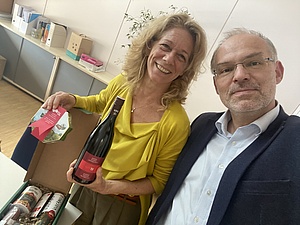
We had a visit from the vice-rector Stefan Vorbach at the CGV, who brought a little token of appreciation for Ursula Augsdörfer to say thank you for her engagement as dean of study of the faculty CSBME. Although time consuming, Ursula Augsdörfer enjoyed her time working together with colleagues and the vice-rectorate to improve various processes related to the studies at our faculty.
As can be seen on the photo, Ursula Augsdörfer was happy about the food package vice-rector Stefan Vorbach presented her with.
CGV Guest Speakers – 28. May 2024

It was nice to welcome Stefan Ohrhallinger and Diana Marin from TU Wien, who presented their work on curve and surface reconstruction at our institute on the 28th of May. Mr. Ohrhallinger is working on curve and surface reconstruction for the last 13 years, while Mrs. Marin has been working on topics related to computer graphics since her Master at Leeds University and focused on curve reconstruction during hr PhD. It was an interesting talk with many insights, which was following up by a lively research discussion with some good food.
Presentation at the 15th International EuroVis Workshop


We congratulate PhD student Mariia Tytarenko on her first conference presentation ah the 15th International EuroVis Workshop on Visual Analytics on May 27 in Odense, Denmark. The research paper "Hierachical Topic Maps for Visual Exploration and Comparision of Documents" constitutes a novel approach for topic-based document exploration, inspired by a tilebar metaphor.
PhD awarded to Simon Kloiber

We congratulate Simon Kloiber to the successful defense of his PhD thesis titled "Data in Motion - Immersive Analytics of Spatio-Temporal Data in Virtual Reality" on April 26, 2024. The image (left) shows Prof. Bernhard Aichernig (dean of studies and head of examination committee, TU Graz), Simon Kloiber, and Prof. Tobias Schreck (advisor, TU Graz). Visible in the image top right is TT-Prof. Tiare Feuchtner (University of Konstanz) who served as external reviewer and examiner. Simon's PhD research was conducted within the FFG project VR4CPPS and follow-up projects.
Waffles&Wires: Bachelor- and Master Thesis - Friday, March 8, 2024
Computer Graphics for Breakfast –
Bachelor- and Master-Thesis Summer Term 2024
Get to know topics and people:
Fraunhofer Austria and the Institute for Computer Graphics and Knowledge Visualization (CGV) invite you to breakfast at the start of the semester:
Friday, March 8, 2024, from 09:00 to 11:30 in the seminar room of the CGV (Inffeldgasse 16c, 2nd floor).
Over coffee and waffles, you can have a relaxed chat about bachelor's and master's thesis topics.
You can find the slides for the topics here or more information here.
We are looking forward to your coming!!
Research Presentation at TU Graz Science Day 2023
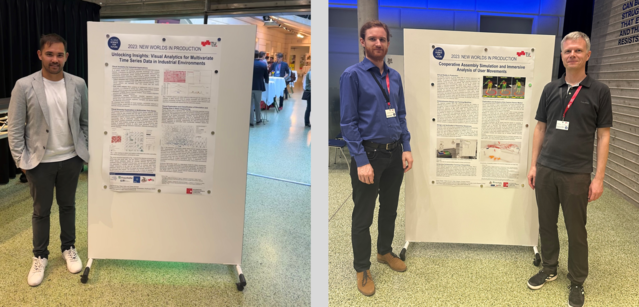
We participated in the TU Graz Science day, September 27, 2023 with two posters on recent work. Josef Suschnigg presented "Visual Analytics for Multivariate Time Series Data in Industrial Environments", and Simon Kloiber and Volker Settgast presented "Cooperative Assembly Simulation and Immersive Analysis of User Movements". Please reach out to us if interested in our topics.
Waffles&Wires: Bachelor- and Master Thesis - Friday, October 06, 2023
Computer Graphics for Breakfast –
Bachelor- and Master-Thesis Winter Term 2023/24
Get to know topics and people:
Fraunhofer Austria and the Institute for Computer Graphics and Knowledge Visualization (CGV) invite you to breakfast at the start of the semester:
Friday, October 06, 2023, from 09:00 to 11:30 in the seminar room of the CGV (Inffeldgasse 16c, 2nd floor).
Over coffee and waffles, you can have a relaxed chat about bachelor's and master's thesis topics.
You can find the slides for the topics here or more information here.
We are looking forward to your coming!!
PhD awarded to Stefan Lengauer
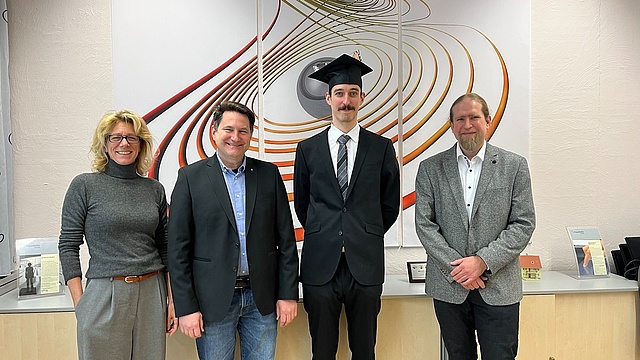
We congratulate Stefan Lengauer to the successful defense of his PhD thesis titled "Crossmodal Search, Visual Exploration, and Restoration of Digital Pottery Artifacts" on December 21, 2022. Stefan's thesis was advised by Prof. Tobias Schreck (TU Graz) and conducted within the FWF project CrossSave. The image shows Stefan (second from right) and the examination committee comprising from left to right Professors Ursula Augsdörfer (dean of study, TU Graz), Tobias Schreck (advisor, TU Graz), and Hubert Mara (external reviewer and examiner, University of Halle, Germany).
Oliver Deussen: Visualizing Graph Structures
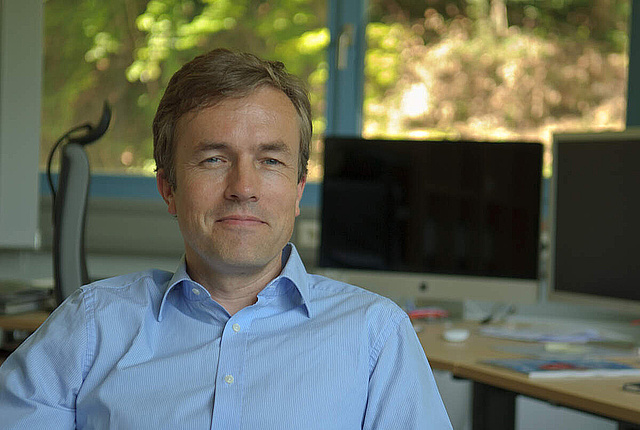
July 05th, 2022, | 1:00 pm
Place: SR CGV
Inevitably, the projection of most graph structures on two-dimensional screens will create errors and therefore visually wrong impressions. In the past, two types of methods have been developed to minimize projection errors and distribute them in a visually pleasing way. The first group of methods, force-directed layouts, interpret the links of a graph as physical springs, while stress-based methods minimize an energy function, which aims to map graph distances faithfully. A unified description of both method types allows to create optimal parameters for both and even to specify new, better methods for most graphs. The addition of vector-based constraints enable systems to render graphs with different layouts and under varying perspectives. Finally, I will show that deviating from all kinds of physical metaphors is a good idea to create even better projection methods.
Participants for Survey on Diabetes Information Requirements Wanted
We are looking for Diabetes-affected persons or their next of kin for personal survey interviews. Within our A+CHIS FWF Research group, we are currently gathering requirements for an adaptive visual information system on Diabetes. Your interview will be very valuable to inform the requirements and the system development of a novel, personalized visual diabetes information system. To register, please send an E-Mail to our project partners at the Institute of Psychology, University of Graz. This study is within our A+CHIS FWF Research Group on Human-Centered Interactive Adaptive Visual Approaches in High-Quality Health Information. Thank you very much for your participation or for forwarding this flyer to interested persons you know.
Implementing a Learned Avatar in the DAVE
![]()
28. January 2022. In a cooperation with the TU Graz ISDS and Krzysztof Pietroszek (Institute for Immersive Designs, Experiences, Applications and Stories at American University in Washington DC, USA) we ported a new avatar model recently proposed by Rebol et al. (2021) into our DAVE system. The avatar was trained for gesticulation from example video material using Machine Learning, and adapts to its speech. Based on this feasibility study, we plan to continue researching methods and applications for adaptive avatars in immersive environments.
PhD awarded to Robert Gregor
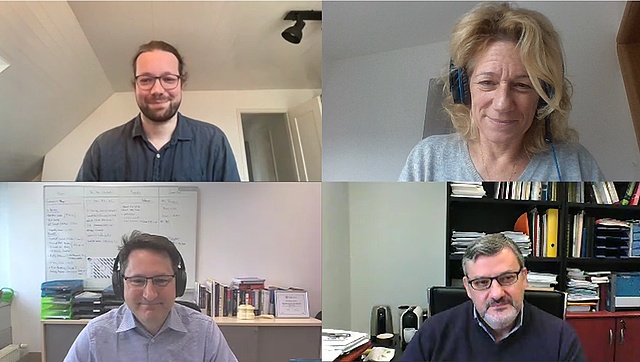
We congratulate Robert Gregor to the successful defense of his PhD thesis titled "Similarity-based Techniques for Automated 3D Restoration of Digitized Cultural Heritage Artifacts" on November 23, 2021. Robert's thesis was advised by Prof. Tobias Schreck (TU Graz). The image shows Robert (top left) and the examination committee comprising Professors Ursula Augsdörfer (top right, dean of study, TU Graz), Tobias Schreck (bottom left, TU Graz) and Ioannis Pratikakis (external reviewer and examiner, Democritus University of Thrace).
New Video on our DAVE Lab available
Our DAVE is an immersive environment for exploration and interaction with large 3D scenes, objects and data sets. You can see some of its capabilities in the new video. If you are interested in doing a project or thesis with immersive visualization technologies, please contact any of our staff.
PhD awarded to Lin Shao
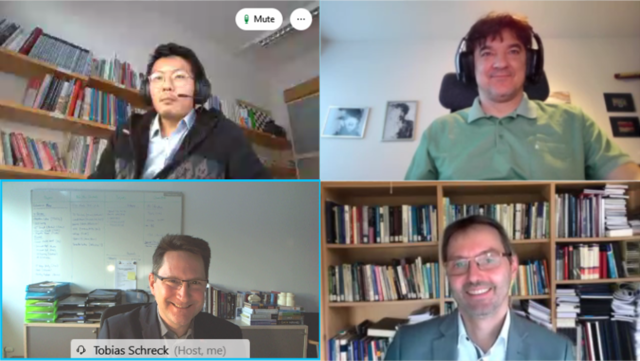
We congratulate Lin Shao to the successful defense of his PhD thesis titled "Interactive Visual Analysis and Guidance Methods for Discovering Patterns in High-Dimensional Data" on January 11, 2021. Lin's thesis was advised by Prof. Tobias Schreck (TU Graz). The image shows Lin (top left) and the examination committee comprising Profs. Denis Helic (top right), Tobias Schreck (bottom left) and Daniel Keim. We are glad that Lin continues his work as a Postdoc researcher at our institute.
PhD awarded to Mohammad Chegini within Joint PhD Program in Visual Computing between TU Graz and NTU Singapore
We congratulate Mohammad Chegini to the successful defense of his PhD thesis titled "Visual Data Analysis Supported by Eye-Tracking, Multi-Touch Displays, and Machine Learning" on December 10, 2020. Mohammad's thesis was co-advised by Prof. Dr. Tobias Schreck (TU Graz), Prof. Dr. Alexei Sourin (Nanyang Technological University, Singapore), and also, Prof. Dr. Keith Andrews (TU Graz). Mohammad is the second Graz alumni of the joint PhD Program in Visual Computing between TU Graz and NTU Nanyang. The work of Mohammad included a one year research stay at Nanyang. The image shows Mohammad Chegini and the examination committe (Alexei Sourin, Denis Helic, Keith Andrews and Tobias Schreck).
Nelson J. S. Silva - PhD Thesis

© privat
We congratulate Nelson J. S. Silva to the successful defence of his PhD thesis titled "Adaptive User Interfaces Based on Visualization, Analysis and Prediction of User's Interactions and Behaviors" on April 30, 2020.
Phd Commission: Advisor Tobias Schreck and committee members Wolfgang Aigner, Stefanie Lindstaedt, and Denis Helic.
In his thesis, he presents novel approaches to infer users' behaviours and interests through the combination of sensor data, user interactions and underlying data features, to develop new adaptive user interfaces that can support the users in their data analysis tasks.
Please find here the complete abstract
We congratulate Dr. Augsdörfer to her new position
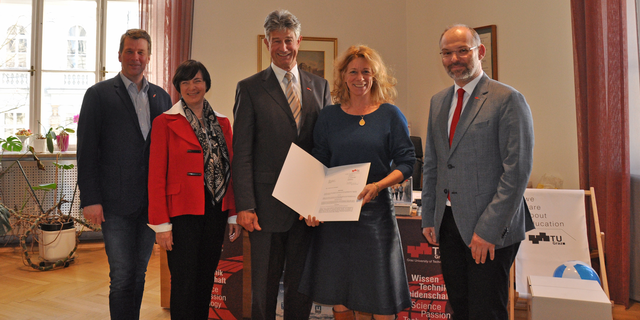
On the 1st of February 2020 the Rectorship of Graz University of Technology awards Ursula Augsdörfer her state doctorate (Habilitation). From left to right: Horst Bischof, Claudia von der Linden, Harald Kainz, Ursula Augsdörfer and Stefan Vorbach. We congratulate Ursula Augsdörfer to starting her new position as Associate Professor at the Institute of Computer Graphics and Knowledge Visualisation on the 1st of April 2020.
Themenvorstellung Bachelor- und Masterarbeiten 09.03.2020 13-14:00 Uhr
Wir stellen Ideen für Master- bzw Bachelorarbeiten und Seminar-und Masterprojekte im Sommersemester kompakt & unverbindlich vor - z.T. auch bezahlt im Rahmen von Projekten - first come, first serve!
Wer also gerne einmal wissen möchte, woran wir und die Studierenden am CGV / FhA arbeiten, ist herzlich eingeladen zu unserer Themenvorstellung am
Montag, 9. März 2020, 13:00-14:00 Uhr, im Seminarraum des Instituts, Inffeldgasse 16c/2. Stock.
Die Arbeitsgebiete umfassen ein breites Spektrum von Themen in der Computergrafik z.B. CAD/CAGD, prozedurale Modellierung, 3D Ähnlichkeitssuche, virtuelle Restaurierung von 3D Objekten, 3D Realismus, Simulation und Animation, als auch visuell-interaktive Datenanalyse (Visual Analytics, visuelle Suche) sowie Digital Libraries Technologien.
Wir freuen uns auf Euer Kommen!
Das CGV- & Fraunhofer-Team
Computergrafik zum Frühstück – Bakk- und Master-Themen 2020
Themen und Leute kennenlernen:
Fraunhofer Austria und das Institut für Computergraphik und Wissensvisualisierung (CGV) laden zum Semesterstart zum Frühstück ein:
Freitag, 6.3.2020, ab 08:30 im Seminarraum des CGV (Inffeldgasse 16c, 2. OG).
Bei Kaffee und Waffeln kann man sich entspannt über Bakk.- und Masterarbeitsthemen unterhalten.
Die konzentrierte Themenvorstellung (ohne Frühstück) findet dann nochmals am Montag, den 09.03., um 13:00 Uhr, im Seminarraum des CGV statt.
Nach dem Motto „Ein leerer Bauch studiert nicht gern“, freuen wir uns auf Euer Kommen.
Die Teams von Fraunhofer Austria und CGV
PRESSEMITTEILUNG 2.10.2019: Fraunhofer Austria gründet Innovationszentrum „KI4LIFE“ in Kärnten
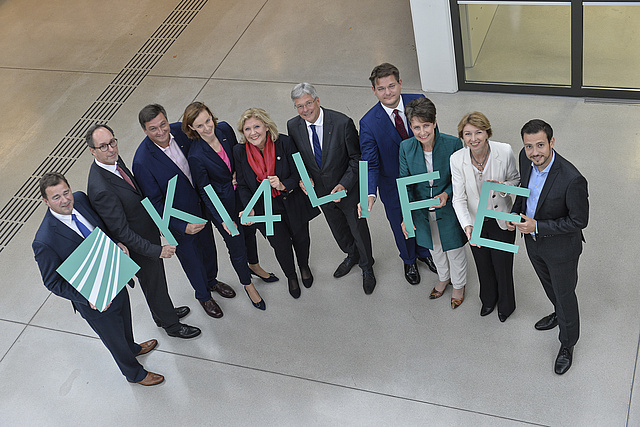
Bündnis aus Wirtschaftsvertretern, Unternehmen und Forschungseinrichtungen wird Kärntner Betriebe bei der Digitalisierung und dem zentralen Zukunftsthema Künstliche Intelligenz unterstützen
Seit ihrer Gründung 2008 unterstützt die Fraunhofer Austria Research GmbH Unternehmen aller Größen und Branchen als unabhängiger Partner mit Know-how und Expertise. Zu den Standorten Wien, Graz und Wattens, an denen bereits jetzt mehr als 70 Mitarbeiterinnen und Mitarbeiter an anwendungsorientierten Lösungen arbeiten, kommt nun mit dem Innovationszentrum »Digitalisierung und Künstliche Intelligenz“ – kurz KI4LIFE – in Klagenfurt ein vierter Standort hinzu. Seit 1. Oktober 2019 arbeitet dort bereits ein Startteam aus WissenschaftlerInnen an konkreten Problemlösungen, um Kärntner Unternehmen bei den Herausforderungen der Digitalisierung zu unterstützen. Im Vollausbau soll die Mitarbeiterzahl auf 15 Vollzeitangestellte steigen, langfristig ist ein weiteres Wachstum auf 30 geplant. Das Innovationszentrum wird vorerst in unmittelbarer Nähe der Universität Klagenfurt – in der Universitätsstraße 102 – angesiedelt sein, im Juli 2020 zieht es in den Lakeside Park.
Ermöglicht wird das Zentrum durch ein Bündnis starker Partner: Fraunhofer stellt Spitzen-Knowhow und ein aus weltweit 72 Instituten und über 26.000 ForscherInnen bestehendes Netzwerk zur Verfügung, führende Kärntner Unternehmen wie Infineon Austria bringen ihre Kompetenzen, ihr Netzwerk und ihren Bedarf ein, die Wirtschaftskammer Kärnten sowie die Wirtschaftskammer Österreich und die Industriellenvereinigung legen einen direkten Draht zu Unternehmen, die Stadt Klagenfurt und das Land Kärnten stärken das Zentrum mit seiner Unterstützung. Sieben Forschungsgruppen der Fakultät für Technische Wissenschaften der Universität Klagenfurt betreiben Forschung in fachlicher Nähe zur Ausrichtung des Zentrums und werden durch Kooperationen Synergien erschließen. Über das bestehende Konsortium hinaus sind zukünftig Kooperationen mit Joanneum Research und der Fachhochschule Kärnten geplant. Mit seiner anwendungsorientierten Forschung wird KI4LIFE die Brücke zwischen universitärer Forschung und Industrie schlagen.
Die Zusammenarbeit mit der Universität, die über den Wissensaustausch hinaus auch noch die Zusammenarbeit bei herausfordernden Industrieprojekten umfasst, ist eine der drei Säulen des Tätigkeitsprofils von KI4LIFE. Eine weitere wesentliche Säule ist die Auftragsforschung im Rahmen der Projekttätigkeit, die auch die wirtschaftliche Basis des Zentrums darstellt. Die dritte Säule ist die Analyse- und Beratungstätigkeit für kleine und mittlere Unternehmen. Dafür werden in Österreich verfügbare Instrumente wie zum Beispiel Beratungsschecks genutzt. Die Weiterqualifizierung von Mitarbeiterinnen und Mitarbeitern sowie das Thema Bildung spielen in allen Tätigkeitsbereichen des Innovationszentrums eine große Rolle.
Die Stellungnahmen der Partner finden Sie hier.
Die Fraunhofer Austria Research GmbH wurde Ende 2008 als erste europäische Tochtergesellschaft der Fraunhofer-Gesellschaft gegründet. In den beiden Geschäftsbereichen »Produktions- und Logistikmanagement« und »Advanced Industrial Management« in Wien, im Geschäftsbereich »Visual Computing« in Graz sowie dem Fraunhofer Innovationszentrum »Digitale Transformation der Industrie« in Tirol arbeiten derzeit rund 50 Wissenschaftlerinnen und Wissenschaftler an anwendungsorientierten Lösungen zum Nutzen der Wirtschaft und zum Vorteil der Gesellschaft. Forschen für die Praxis ist die zentrale Aufgabe der Fraunhofer-Einrichtungen.
Ehrenpromotion Prof. Dieter W. Fellner
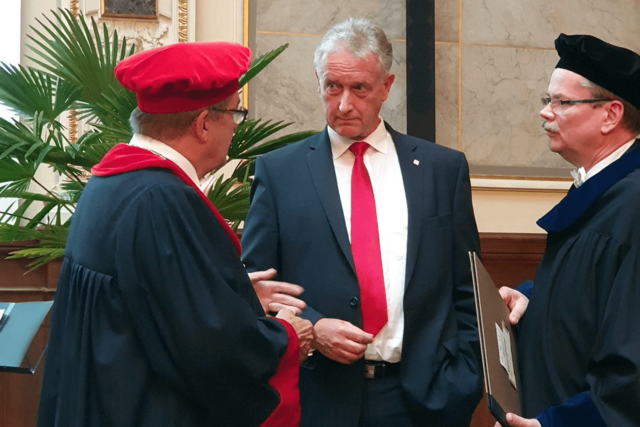
Am 30. September 2019 wurde Prof. Dieter W. Fellner die Würde eines Doktor-Ingenieur ehrenhalber der Universität Rostock verliehen.
Wir gratulieren herzlichst Prof. Dieter W. Fellner, Institutsleiter des CGV der TU Graz und des IGD in Darmstadt, dem für seine hervorragende wissenschaftliche Leistung die Würde eines Doktor-Ingenieur ehrenhalber (Dr.-Ing. eh.) von der Universität Rostock verliehen wurde. Die Auszeichnung fand im Rahmen der Feierlichkeiten zum 50-jährigen Bestehen der Computergraphik an der Universität Rostock statt.
»Traditio et Innovatio« – so das Motto der Universität Rostock, das nicht nur durch den Tag führte, sondern auch durch die Geschichte der Computergraphik-Forschung. Einst nur als Nischenfach vorzufinden, ist sie heute ein wesentlicher Bestandteil der Forschungs-, Lebens- und Arbeitswelt. Im Rahmen seiner Dankesrede erklärte Prof. Fellner, dass er als Leiter des Fraunhofer-Instituts für Graphische Datenverarbeitung IGD insbesondere die Herausforderungen schätze, welche die angewandte Forschung mit sich bringt. Rückblickend bedankte er sich vor allem bei den Mentoren, Kollegen, Studenten und Mitarbeitern, die seine Zeit an diversen Universitäten und bei Fraunhofer geprägt haben.
Themenvorstellung Bakk.-Masterarbeiten 7.10.2019
Wir stellen Ideen für Master- bzw Bachelorarbeiten und Seminar-und Masterprojekte im Sommersemester kompakt & unverbindlich vor - z.T. auch bezahlt im Rahmen von Projekten - first come, first serve!
Wer also gerne einmal wissen möchte, woran wir und die Studierenden am CGV / FhA arbeiten, ist herzlich eingeladen zu unserer Themenvorstellung am
Dienstag, 7.10.2019, 14:00 Uhr, im Seminarraum des Instituts, Inffeldgasse 16c/2. Stock.
Die Arbeitsgebiete umfassen ein breites Spektrum von Themen in der Computergrafik z.B. CAD/CAGD, prozedurale Modellierung, 3D Ähnlichkeitssuche, virtuelle Restaurierung von 3D Objekten, 3D Realismus, Simulation und Animation, als auch visuell-interaktive Datenanalyse (Visual Analytics, visuelle Suche) sowie Digital Libraries Technologien.
Wir freuen uns auf Euer Kommen!
Das CGV- & Fraunhofer-Team
Computergrafik zum Frühstück – Bakk- und Master-Themen 2019
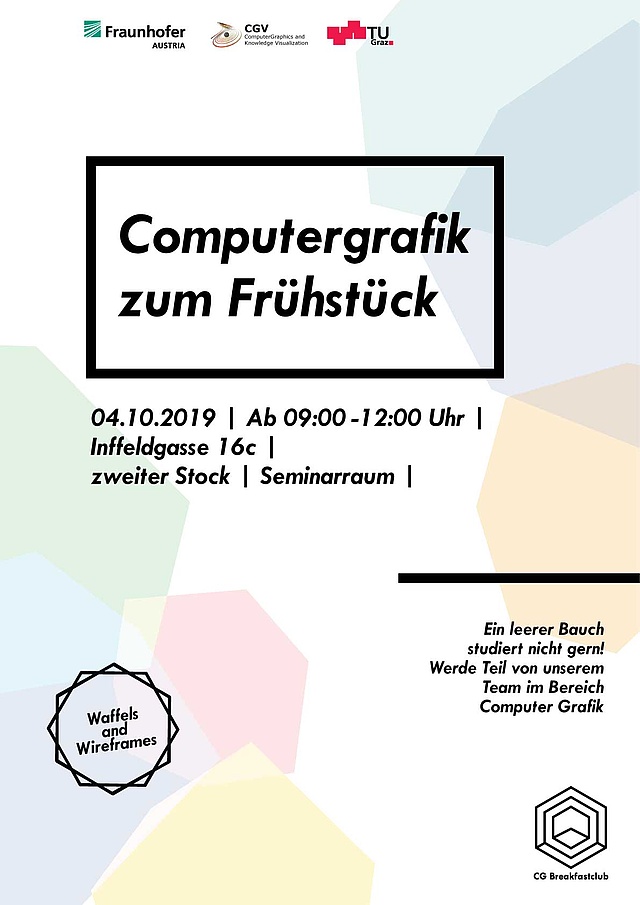
Themen und Leute kennenlernen:
Fraunhofer Austria und das Institut für Computergraphik und Wissensvisualisierung (CGV) laden zum Semesterstart zum Frühstück ein:
Freitag, 4.10.2019, vormittags im Seminarraum des CGV (Inffeldgasse 16c, 2. OG).
Bei Kaffee und Waffeln kann man sich entspannt über Bakk.- und Masterarbeitsthemen unterhalten.
Die konzentrierte Themenvorstellung (ohne Frühstück) findet die Woche darauf (Termin wird in Kürze bekannt gegeben) im Seminarraum des CGV statt.
Nach dem Motto „Ein leerer Bauch studiert nicht gern“, freuen wir uns auf Euer Kommen.
Die Teams von Fraunhofer Austria und CGV
PhD: Andreas Riffnaller-Schiefer
We congratulate Andreas Riffnaller-Schiefer to the successful defense of his PhD thesis titled "A subdivision approach to isogeometric analysis"on June 18, 2019. In his thesis, he presents novel approaches to closely integrate computer-aided design (CAD) and computer-aided engineering (CAE) with applications e.g., in modelling and deformation simulation. The image shows Andreas Riffnaller-Schiefer (second from right) together with his advisor Prof. Dr. Dieter W. Fellner (TU Graz and Fraunhofer IGD, left), co-examiner Prof. Dr. André Stork (TU Darmstadt and Fraunhofer IGD, second from left), Assoc.Prof. Denis Helic (right), head of the PhD examination, and Ass.Prof. Ursula Augsdörfer (TU Graz, co-advisor, center).
PhD: Johannes Edelsbrunner - Joint PhD Programm
Rektor Kainz und Professor Fellner überreichten am 8.4.2019 DI Johannes Edelsbrunner die Urkunde der Nanyang Technological University, Singapur. Edelsbrunner absolvierte als erster Outgoing Kandidat in Singapur das Joint PhD Programm Visual Computing.
Informationen zum Joint Doctoral Programme Visual Computing finden Sie hier.
Themenvorstellung Bakk.-Masterarbeiten
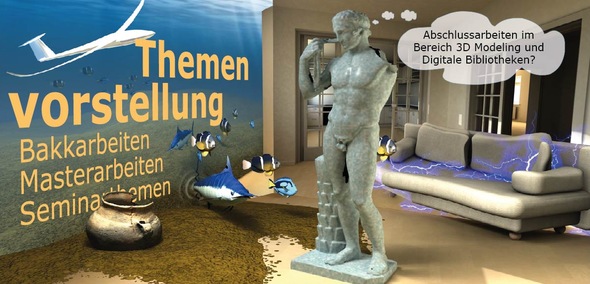
Wir stellen Ideen für Master- bzw Bachelorarbeiten und Seminar-und Masterprojekte im Sommersemester kompakt & unverbindlich vor - z.T. auch bezahlt im Rahmen von Projekten - first come, first serve!
Wer also gerne einmal wissen möchte, woran wir und die Studierenden am CGV / FhA arbeiten, ist herzlich eingeladen zu unserer Themenvorstellung am
Dienstag, 12.3.2019, 13:00 Uhr, im Seminarraum des Instituts, Inffeldgasse 16c/2. Stock.
Die Arbeitsgebiete umfassen ein breites Spektrum von Themen in der Computergrafik z.B. CAD/CAGD, prozedurale Modellierung, 3D Ähnlichkeitssuche, virtuelle Restaurierung von 3D Objekten, 3D Realismus, Simulation und Animation, als auch visuell-interaktive Datenanalyse (Visual Analytics, visuelle Suche) sowie Digital Libraries Technologien.
Wir freuen uns auf Euer Kommen!
Das CGV- & Fraunhofer-Team
Computergrafik zum Frühstück – Bakk- und Master-Themen
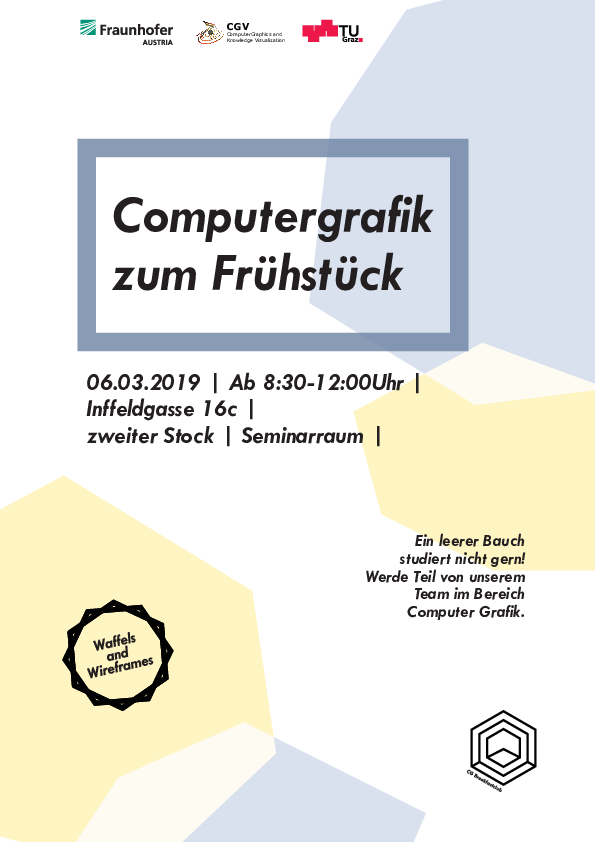
Themen und Leute kennenlernen:
Fraunhofer Austria und das Institut für Computergraphik und Wissensvisualisierung (CGV) laden zum Semesterstart zum Frühstück ein:
Mittwoch, 6.3., vormittags im Seminarraum des CGV (Inffeldgasse 16c, 2. OG).
Bei Kaffee und Waffeln kann man sich entspannt über Bakk.- und Masterarbeitsthemen unterhalten.
Die konzentrierte Themenvorstellung (ohne Frühstück) findet dann nochmals am Dienstag, den 12.3., um 13:00 Uhr, im Seminarraum des CGV statt.
Nach dem Motto „Ein leerer Bauch studiert nicht gern“, freuen wir uns auf Euer Kommen.
Die Teams von Fraunhofer Austria und CGV
Amir Dini receives 2018 TU Graz Prize of Gender and Diversity for Master Project on "Enjoyment Training for a Fulfilled Life"
As part of the master project "VR-SenseCity", which was supervised by the Institute for Computer Graphics and Knowledge Visualization, Fraunhofer Austria (advisor Dr. Volker Settgast) and the JOANNEUM RESEARCH DIGITAL, Amir Dini has developed a virtual environment for the enjoyment training of elderly people. The program seeks to activate the five senses and the associated personal experiences and motivates for a mindful, meaningful life in everyday life. The users are put into an archetypal scenario that enables a journey between sensory portals, each providing virtual access to enjoyable sensory experiences. VR-SenseCity enables intuitive interactions as well as attention and emotion measurements for a detailed analysis of the mental state of users. The studies showed that the mood of the participants after the experience were higher than before, with a significant increase. The master project was financed by the Future Fund Styria (project "SenseCity") and the JOANNEUM RESEARCH DIGITAL and co-operatively developed with partner organizations FH JOANNEUM and GEFAS.
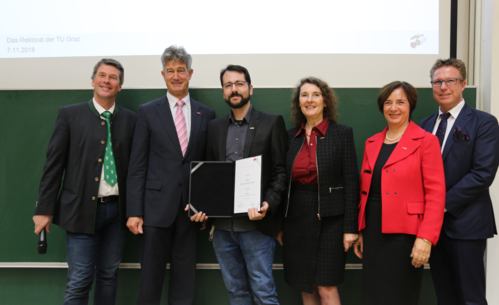
Amir Dini (third from left) at the price reception together with the rectorship of TU Graz. More information can be found here.
PhD awarded for Ulrich Krispel for thesis on Generative Modeling Approaches
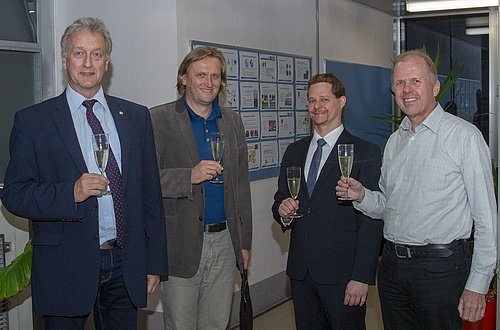
We congratulate Ulrich Krispel to the successful defense of his PhD thesis titled "Generative Methods for Data Completion in Shape Driven Systems" on November 14, 2018. In his thesis, he presents novel approaches for generative forward and inverse modeling, with applications among others in processing and analyzing digital building models. The image shows Ulrich Krispel together with his advisor Prof. Dr. Dieter W. Fellner (TU Graz and Fraunhofer IGD, left), co-examiner Prof. Dr. Werner Purgathofer (TU Wien, right), and head of the PhD examination, Prof. Dr. Gernot Müller-Putz (TU Graz, second from left).
PhD awarded for Johannes Edelsbrunner within Joint PhD Program in Visual Computing between TU Graz and NTU Singapore
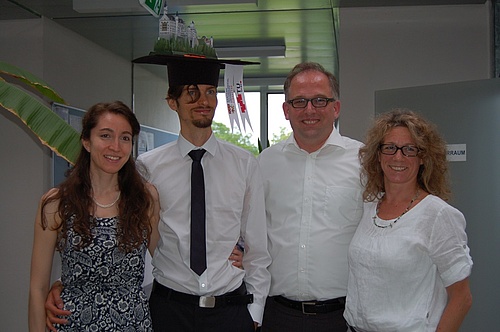 We congratulate Johannes Edelsbrunner to the successful defense of his PhD thesis titled "Domain-specific Methods for Procedural Modeling of Historic Architecture" on June 14, 2018. Johannes' thesis was co-advised by Priv.Doz. Dr. Sven Havemann (TU Graz and Dassault Systems, second from right in the image) and Prof. Dr. Alexei Sourin (Nanyang Technological University, Singapore). Johannes is the first Graz alumni of the joint PhD Program in Visual Computing between TU Graz and NTU Nanyang. The work of Johannes included a one year research stay at Nanyang.
For more information on the program see the program webpage. Please also refer to the application possibilities to the program if you are interested.
We congratulate Johannes Edelsbrunner to the successful defense of his PhD thesis titled "Domain-specific Methods for Procedural Modeling of Historic Architecture" on June 14, 2018. Johannes' thesis was co-advised by Priv.Doz. Dr. Sven Havemann (TU Graz and Dassault Systems, second from right in the image) and Prof. Dr. Alexei Sourin (Nanyang Technological University, Singapore). Johannes is the first Graz alumni of the joint PhD Program in Visual Computing between TU Graz and NTU Nanyang. The work of Johannes included a one year research stay at Nanyang.
For more information on the program see the program webpage. Please also refer to the application possibilities to the program if you are interested.
PhD awarded for Christoph Schinko shows fruitful cooperation between TU Graz and Fraunhofer Austria Visual Computing
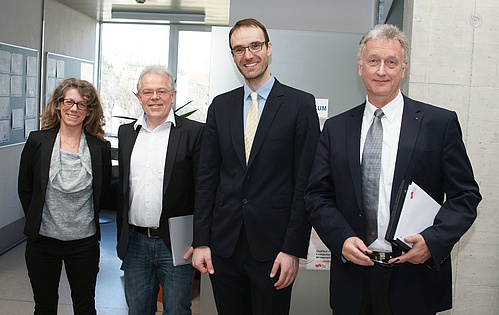 We congratulate Christoph Schinko to the successful defense of his PhD thesis titled "Shape Processing for Content Generation" on March 12, 2018. His thesis presents work on generative modeling, novel applications for inverse generative modeling, and visualization systems. His advisor Prof. Dr. Dieter W. Fellner (TU Graz and Fraunhofer IGD, right in the image) and Prof. Dr. Reinhard Klein (University of Bonn, second from left in the image) were the members of the board of examiners.
We congratulate Christoph Schinko to the successful defense of his PhD thesis titled "Shape Processing for Content Generation" on March 12, 2018. His thesis presents work on generative modeling, novel applications for inverse generative modeling, and visualization systems. His advisor Prof. Dr. Dieter W. Fellner (TU Graz and Fraunhofer IGD, right in the image) and Prof. Dr. Reinhard Klein (University of Bonn, second from left in the image) were the members of the board of examiners.
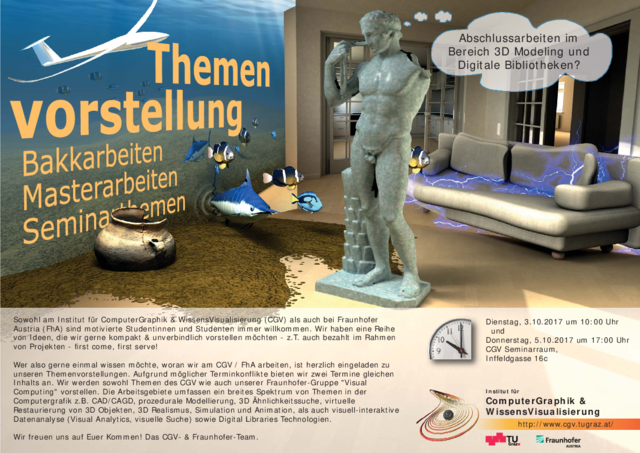
EG Workshop on Graphics and Cultural Heritage 2017 in Graz
- Keynotes by distinguished speakers Michael Goesele, TU Darmstadt and Sabine Ladstätter, Austrian Institute of Archaeology
- Tutorial program on digitization, analysis and presentation of cultural heritage content
- Paper program in full and short paper trackRich social program including an optionally bookable excursion to the Styrian countryside on September 30
- Student participation sponsorships available

Ministerpräsident Volker Bouffier zu Besuch

Virtual Reality Night 2016
Wann?
28. Juni 2016, 17:00 UhrWo?
Inffeldgasse 25DWeitere Details?
Sowie Anmeldeinformationen können der Einladung hier entnommen werden. Um besser planen zu können, ersuchen wir um Anmeldung per Email an vr-night16@cgv.tugraz.at bis zum 22. Juni 2016. Wir freuen uns auf Ihre Teilnahme."Bauen auf Fraunhofer"
Leitung Geschäftsbereich Visual Computing
